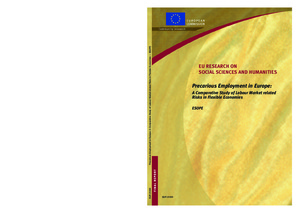Precarious employment in Europe: a comparative study of labour market related risks in flexible economies
"The ESOPE project focused on precarious employment (PE). It sought to study how PE is understood in both scientific and policy terms, what is its incidence, and how it could be explained, paying particular attention to sectoral and policy factors. To do this, the project undertook three main s...
| Main Authors: | , , , , , , |
|---|---|
| Institution: | ETUI-European Trade Union Institute |
| Format: | TEXT |
| Language: | English |
| Published: |
Luxembourg
2005
Office for Official Publications of the European Communities |
| Subjects: | |
| Online Access: | https://www.labourline.org/KENTIKA-19180507124919087899-Precarious-employment-in-europ.htm |
| Summary: | "The ESOPE project focused on precarious employment (PE). It sought to study how PE is understood in both scientific and policy terms, what is its incidence, and how it could be explained, paying particular attention to sectoral and policy factors. To do this, the project undertook three main strands of research: literature review, policy analysis, and empirical research through case studies. Three dynamic and expanding service sectors were the object of in-depth case study research: Call Centres, studied in Spain, Italy and Germany; the Performing Arts, studied in France and the UK, and, through existing surveys, at the EU-15 level; and Domiciliary Care for the Elderly, studied in Spain, France, Italy, and England. In the five countries of our study there is usually a reference, often implicit, to a standard or norm of employment, and what falls below such a norm (and can thus be considered precarious) is expressed in each country by means of different notions, e.g. insecure, poor quality, casual or indeed precarious employment. Yet, such a norm is comparatively weak in the UK, and the term PE is rarely used in the UK and only in some scientific contexts in Germany.
PE was understood as a multidimensional concept involving diverse combinations of insecurity and instability, poor working conditions, insufficient pay, and lack of protection. Operationally, however, this notion presents a major problem: how to combine these dimensions in an integrated measure - a challenging problem also obtaining in the case of the notion of 'quality of employment' to which no satisfactory solution, as f ar as we known, has been provided in the literature. Estimations of the incidence of PE at the national level may however be done through the aggregation of different forms of PE. Such estimations vary, as it may range from 25-30% in some countries to 40-45% of total employment in others - figures which might be higher if account were taken of PE in the informal economy and hybrid forms of employment combining characteristics of self and waged employment which seem to have recently grown. Overall, the research evidence showed a very high incidence of PE in the three service sectors studied. Indeed these sectors were found to be largely built on the basis of highly varied and complex patterns of PE: fixed-term, marginal, agency, and casual employment; low working hours; self and quasi self-employment; project and on call work; and undeclared and illegal work. Overall there are no professional prospects (call centres), seniority and salary progression are almost systematically denied (particularly in call centres), trajectories are discontinuous and unpredictable (domiciliary care and performing arts), and the exit rate is very high in the three sectors.
The blurring of boundaries between employment (which implies a status) and work, and between employment and self-employment, were found to be crucial to account for PE. Its growth appears linked to labour market deregulation, the encroachment of commercial law on labour law, and the spread of practices such as outsourcing and contracting-out. In particular, our empirical research has provided ample evidence showing that the generation of PE in the sectors studied is directly linked to the emergence of new modes of business and work organisation based on a redefinition of what their economic activity consists in, which directly results in a redefinition of employment itself as a set of circumscribed work tasks, projects or assignments. Relevant policy implications were drawn concerning the need to very significantly improve the survey instruments to better reflect the reality of employment (particularly in what concerns the new employment hybrids combining self and waged employment, low working hours, constrained part-time, low wage employment and the working poor, and undeclared and illegal work); further research needed; implications concerning national and European policy making (particularly in terms of new protections and compliance with regulations), and collective bargaining (particularly about the important role of social dialogue)." |
|---|---|
| Physical Description: | VI, 145 p. Digital |

